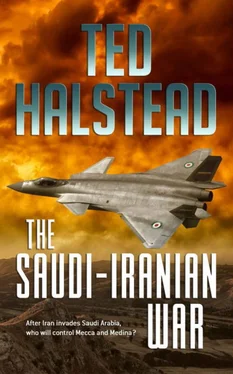Ted Halstead - The Saudi-Iranian War
Здесь есть возможность читать онлайн «Ted Halstead - The Saudi-Iranian War» весь текст электронной книги совершенно бесплатно (целиком полную версию без сокращений). В некоторых случаях можно слушать аудио, скачать через торрент в формате fb2 и присутствует краткое содержание. Год выпуска: 2019, Издательство: Independently published, Жанр: Боевая фантастика, Триллер, на английском языке. Описание произведения, (предисловие) а так же отзывы посетителей доступны на портале библиотеки ЛибКат.
- Название:The Saudi-Iranian War
- Автор:
- Издательство:Independently published
- Жанр:
- Год:2019
- ISBN:нет данных
- Рейтинг книги:4 / 5. Голосов: 1
-
Избранное:Добавить в избранное
- Отзывы:
-
Ваша оценка:
- 80
- 1
- 2
- 3
- 4
- 5
The Saudi-Iranian War: краткое содержание, описание и аннотация
Предлагаем к чтению аннотацию, описание, краткое содержание или предисловие (зависит от того, что написал сам автор книги «The Saudi-Iranian War»). Если вы не нашли необходимую информацию о книге — напишите в комментариях, мы постараемся отыскать её.
The Saudi-Iranian War — читать онлайн бесплатно полную книгу (весь текст) целиком
Ниже представлен текст книги, разбитый по страницам. Система сохранения места последней прочитанной страницы, позволяет с удобством читать онлайн бесплатно книгу «The Saudi-Iranian War», без необходимости каждый раз заново искать на чём Вы остановились. Поставьте закладку, и сможете в любой момент перейти на страницу, на которой закончили чтение.
Интервал:
Закладка:
Whatever it took.
Kazem Shirvani had run into Farhad Mokri less than a block from his apartment.
“Good!”, Farhad exclaimed. “I had been worried I would be late.”
Kazem shook his head. “No, as usual you are exactly on time, one of the things I’ve always liked about you. You’ll have to give me a minute to make tea. I think I mentioned that your aunt is visiting her sister, so you’ll have to put up with my brew again.”
Farhad laughed. “Uncle, you know that the chance to drink tea made right is one of the things that always brings me back home.”
Kazem thought Farhad was just being polite, but was still pleased.
As they entered the apartment, Kazem snapped on the lights. “It will only take me a few minutes. Please, make yourself at home.”
Farhad walked around the living room, looking at the books lining the shelves across from the windows. Unsurprisingly, they were all related to Kazem’s work. As he sat on the large sofa and was nearly swallowed by its cushions, Kazem came in from the kitchen holding a large silver tray full of cakes and cookies.
Farhad smiled. “Uncle, this is very nice of you. I’m beginning to believe I really am your favorite nephew!”
Kazem shrugged. “Actually, it is your aunt you have to thank for this. I called and told her you were coming, and not to cancel the visit she had promised her sister. She must have bought these before she left. Obviously, we need to be finished talking about your project before she returns.”
Kazem was correct about Neda Rhahbar having visited a nearby bakery after his call, and she had planned to go to a movie while supposedly “visiting her sister.” But she had a headache that Neda knew from experience would never let her enjoy the film. So, she had turned off all the lights in the apartment and crawled into bed, hoping the headache would disappear in time to let her spend some time with her nephew, who always had stories about his travels outside Iran.
Neda was still asleep when Kazem and Farhad began their conversation, which began as soon as Kazem had finished pouring their tea.
Kazem took a sip and said, “The first point I must emphasize is that these devices were never intended for use as weapons. Their primary purpose was to give our technicians experience with the challenges involved in nuclear weapons production, and to help us decide which of the three designs we would produce in larger quantities. It is also important to note that while two of the devices were built using Uranium-235, one was built using Plutonium-239.”
Farhad shook his head. “I’m sorry, uncle. Why does the radioactive material used in the weapon matter?”
Kazem raised his eyebrows. “Never apologize for asking when you need knowledge. In fact, I will only be upset if you fail to ask questions. I have been immersed in this program for so long that sometimes I forget what is obvious to me is not to most others.”
Kazem paused, as he thought about the best way to explain the difference between the two nuclear materials. At the same moment, Neda woke up, and reached for the switch on the lamp next to her bed. What she heard next made her hand freeze.
“If you plan to use these nuclear weapons to attack targets in Saudi Arabia, you must use the plutonium device against the one that is the farthest from a population center. That is especially true if there is a subcritical detonation,” Kazem said.
Seeing Farhad’s look of confusion, Kazem smiled. “Let me begin at the beginning. There are three possible outcomes when each of these weapons are detonated. First, it may fail altogether. Second, it may detonate as designed. Third, it may explode, but fail to perform as designed. That would be a subcritical detonation, also called a fizzle.”
Farhad nodded. “I understand, uncle. But why would such a result be more dangerous to people nearby?”
Kazem shrugged. “It might not be. If the plutonium device performs exactly as designed, it would be bad enough for anyone in the area. However, a fizzle would distribute all of the plutonium in the device over a wide area.
The results would be far less spectacular than a successful detonation, but could result in even higher casualties.”
Farhad frowned. “Is the fallout really that dangerous?”
Kazem nodded. “Yes. The basic yardstick is that five hundred grams of powdered plutonium has the potential to kill about two million people if inhaled. A fizzle is likely to both pulverize the plutonium contained in the device, and to send it airborne. Of course, prevailing winds and many other factors will play a role in exactly how much plutonium would be distributed from a fizzle.”
Farhad cocked his head. “And how much plutonium is contained in your device?”
Kazem waved his hands. “I should point out that as with all such devices, the plutonium is present in an alloy with gallium for stability. However, only about one percent of the alloy is gallium. Our design uses about the same amount of plutonium as the device the Americans detonated at Nagasaki, roughly six kilograms.”
Farhad winced as he thought through the figures Kazem had just given.
“So, times two million dead…”
Kazem laughed. “No, no! For a start, there aren’t that many people living in the entire Saudi Eastern Province! Also, though much of the plutonium may be pulverized in a fizzle, some is likely to be ejected from the blast site in solid chunks. Depending on the winds on the day of the explosion, some powdered plutonium will be blown into uninhabited desert. Still, you see why I say the plutonium device should be used as far from a population center as possible.”
Neda, listening in the bedroom upstairs, certainly saw why that was true.
What she didn’t understand was why her husband and nephew were talking about attacking Saudi Arabia with nuclear weapons. It was all the more frustrating that she had to strain to hear their conversation, since she didn’t dare leave the bedroom.
Farhad frowned. “Uncle, what you say about the danger of plutonium from a fizzle deeply concerns me. Casualties are inevitable. But we must avoid deaths numbering in the millions, or abandon this plan. Is there anything else you can tell me about a plutonium release? Has it happened before?”
Kazem shrugged. “Well, yes. There were plutonium fires in the 1950s and 60s at Rocky Flats, a nuclear weapons plant not far from Denver.”
Farhad stared, horrified. “Plutonium fires?”
Kazem nodded. “Yes. Plutonium is pyrophoric, meaning that it can spontaneously combust in ordinary atmosphere, particularly the thin shavings produced during the weapons production process. Safe handing requires working with plutonium in a sealed glove box flushed with argon.”
Farhad repeated, “Glove box…”
Kazem smiled. “Yes. I’m sure you’ve seen them in movies. A clear plastic box with gloves set into them, so that you can reach into the gloves and manipulate whatever is inside the box without allowing the contents to be exposed to the air you are breathing.“
Farhad nodded. “Of course. Didn’t they have these at Rocky Flats?”
Kazem shrugged. “They did, in fact some of the largest I’ve heard of, over sixty feet long. But, something went wrong, twice.”
Farhad lifted both hands. “What went wrong, exactly?”
Kazem grinned. “Who knows? Both fires were covered up until the seventies. Even after the Americans admitted they happened, they continued weapons production there through the eighties. Then a joint raid by the FBI and EPA collected enough evidence to shut down the plant. After that it was torn down and turned into a wildlife refuge. The government started to allow in hikers in 2018.”
Читать дальшеИнтервал:
Закладка:
Похожие книги на «The Saudi-Iranian War»
Представляем Вашему вниманию похожие книги на «The Saudi-Iranian War» списком для выбора. Мы отобрали схожую по названию и смыслу литературу в надежде предоставить читателям больше вариантов отыскать новые, интересные, ещё непрочитанные произведения.
Обсуждение, отзывы о книге «The Saudi-Iranian War» и просто собственные мнения читателей. Оставьте ваши комментарии, напишите, что Вы думаете о произведении, его смысле или главных героях. Укажите что конкретно понравилось, а что нет, и почему Вы так считаете.












